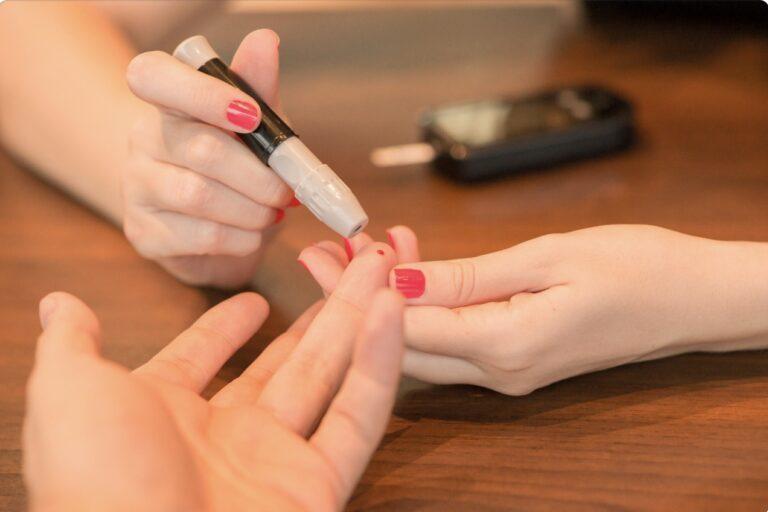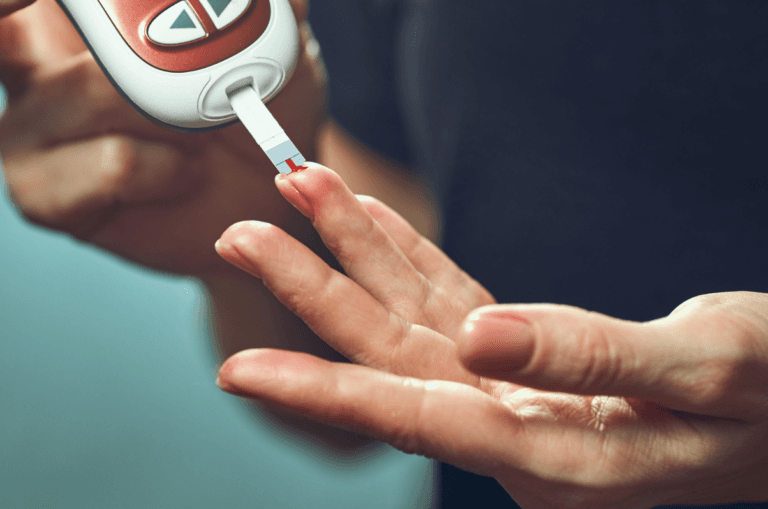
Diabetes (diabetes mellitus) is a serious lifelong condition that affects more than 4.9 million people in the UK. Therefore it’s important to know the three main signs of the condition. Recognising these common symptoms early can help you get started on treatment to prevent more serious complications. Here are the three main signs of diabetes symptoms to watch out for.
What is diabetes?
Diabetes is a chronic condition characterised by excess glucose (high blood glucose) in the blood known as hyperglycemia. The condition affects the way the body processes sugar which is a form of carbohydrate.
There are two main types of diabetes, type 1 and type 2. Type 1 diabetes occurs when the pancreas does not produce enough insulin. Type 2 diabetes occurs when the body does not use insulin properly or the body becomes insulin resistant.
Certain risk factors related to both lifestyle choices and medical conditions put you at a higher risk of diabetes. These include high blood pressure, obesity, high cholesterol, history of gestational diabetes and a family history of the condition.
Complications of diabetes can lead to serious health problems, including heart disease, stroke, kidney damage, vision loss, damage to blood vessels, neuropathy (nerve damage), diabetic ketoacidosis and diabetic retinopathy.
Type 1 and type 2 diabetes
The type of diabetes you have determines how fast symptoms appear. Symptoms of type 2 diabetes take a long time to develop in comparison to type 1 diabetes. There is a stage between having completely normal blood glucose levels and high glucose levels, this is known as pre-diabetes. Many people go through years of prediabetes before a diagnosis of type 2 diabetes is made. When you have prediabetes you have elevated blood glucose levels, but not high enough to diagnose type 2 diabetes.
Type 1 diabetes tends to come on in the early stages of life, such as childhood, adolescence or occasionally early adulthood. In type 1 diabetes the symptoms come on dramatically. If a blood test was carried out on someone with type 1 diabetes a few weeks before they developed symptoms the results would be completely normal. In other words, as far as type 1 diabetes is concerned there is no prediabetes stage.
Type 1 diabetes is an autoimmune disease while type 2 is a metabolic disorder. This means that type 1 diabetes cannot be prevented while type 2 diabetes can often be prevented through lifestyle changes such as healthy eating and getting regular exercise.
What are the three main signs of diabetes ?
Polydipsia (excessive thirst)
Polydipsia is defined as excessive or persistent thirst. It is a symptom of many different medical conditions, including diabetes. With diabetes, polydipsia is caused by high levels of sugar in the blood. The body attempts to rid itself of excess sugar by urinating frequently, which can lead to dehydration and increased thirst. Polydipsia can also be a side effect of certain medications, such as diuretics. Treatment for polydipsia will vary depending on the underlying cause. A dry mouth is often associated with polydipsia therefore it is important to stay hydrated by drinking plenty of fluids and avoiding diuretics. Hormonal disorders can also cause polydipsia.
Polyuria (frequent urination)
Polyuria is defined as urinating more than 3 litres a day. Most people produce about 1–2 litres of urine per day. This condition can be the result of many different underlying causes, including diabetes. In diabetes, the body is unable to properly process glucose, leading to high levels of sugar in the blood. Over time, this can damage the kidneys and cause them to work less efficiently. As a result, they may not be able to remove all the excess sugar from the blood, leading to more frequent urination.
Polyuria can also cause dehydration, which can lead to further complications if left untreated. If you are urinating more frequently than usual, it is important to see a doctor so that the underlying cause can be diagnosed and treated appropriately. Left untreated, polyuria can have serious implications for your health.
Pregnancy, certain medications, hormonal disorders and kidney disease are some of the other conditions that can cause frequent urination.
Polyphagia (increased hunger)
Polyphagia is a medical condition characterised by increased hunger. While it can be caused by things like stress or anxiety, it is most commonly associated with diabetes. When someone has diabetes, their body is unable to properly process glucose, resulting in high levels of sugar in the blood. This can cause the body to release hormones that signal increased hunger, even when the person isn’t actually hungry.
As a result, people with diabetes may find themselves eating more than they normally would. While this increased appetite can help to regulate blood sugar levels, it can also lead to weight gain and other health problems. Therefore, it is important for people with diabetes to monitor their food intake and make sure that they are getting the nutrients they need without overindulging. Increased hunger is often one of the early symptoms to occur in people with type 1 diabetes. In type 2 diabetes, increased hunger may not happen until blood sugar levels are higher than they should be.
Hypothyroidism and Prader-Willi syndrome are some other conditions that cause polyphagia.
Other warning signs of diabetes
- Unexplained weight loss
- Blurred vision
- Slow healing cuts and wounds
- Vaginal yeast infections in women
- Sexual Dysfunction
Tests for diabetes
If your doctor or healthcare professional suspects you have diabetes, the following tests may be carried out to determine if you have diabetes:
- Glucose tolerance test. The glucose tolerance test is usually given to people who have symptoms of diabetes, such as excessive thirst and frequent urination. During the test, you will be given a sugary drink and then your blood will be tested for glucose levels. If your blood glucose level is higher than normal, it may indicate that you have diabetes
- Fasting blood glucose test. The fasting blood glucose test is typically used to screen for diabetes in people who don’t have any symptoms. To prepare for this test, you will need to fast for at least 8 hours before having your blood drawn. If your fasting blood glucose level is higher than normal, it may indicate that you have diabetes
- A simple blood test. This test measures the amount of glucose in your blood. If your glucose level is higher than normal, it could be an indication of diabetes
- The haemoglobin A1c (HbA1c) test. This is a blood test that provides information about a person’s average levels of blood sugar (glucose) over the past three months. The HbA1c test is used to help diagnose diabetes, monitor diabetes and to identify people who are at high risk for developing diabetes
Listen to your body
If you notice any possible diabetes signs or symptoms, contact your doctor. Diabetes is a serious condition and the earlier it’s diagnosed, the sooner treatment can begin. Treatment for diabetes typically includes a combination of diet, exercise and medication. With proper treatment you can prevent serious complications and lead healthy lives. If you’re diagnosed with diabetes, work closely with your healthcare provider and a diabetes care team to create a routine to manage your high blood sugar levels.
Sources
- Polydipsia – Diabetes
- Diabetes (diabetes mellitus) – Diabetes
- Polyphagia – Diabetes
- Diabetes signs – Diabetes
Medical Disclaimer
NowPatient has taken all reasonable steps to ensure that all material is factually accurate, complete, and current. However, the knowledge and experience of a qualified healthcare professional should always be sought after instead of using the information on this page. Before taking any drug, you should always speak to your doctor or another qualified healthcare provider.
The information provided here about medications is subject to change and is not meant to include all uses, precautions, warnings, directions, drug interactions, allergic reactions, or negative effects. The absence of warnings or other information for a particular medication does not imply that the medication or medication combination is appropriate for all patients or for all possible purposes.










